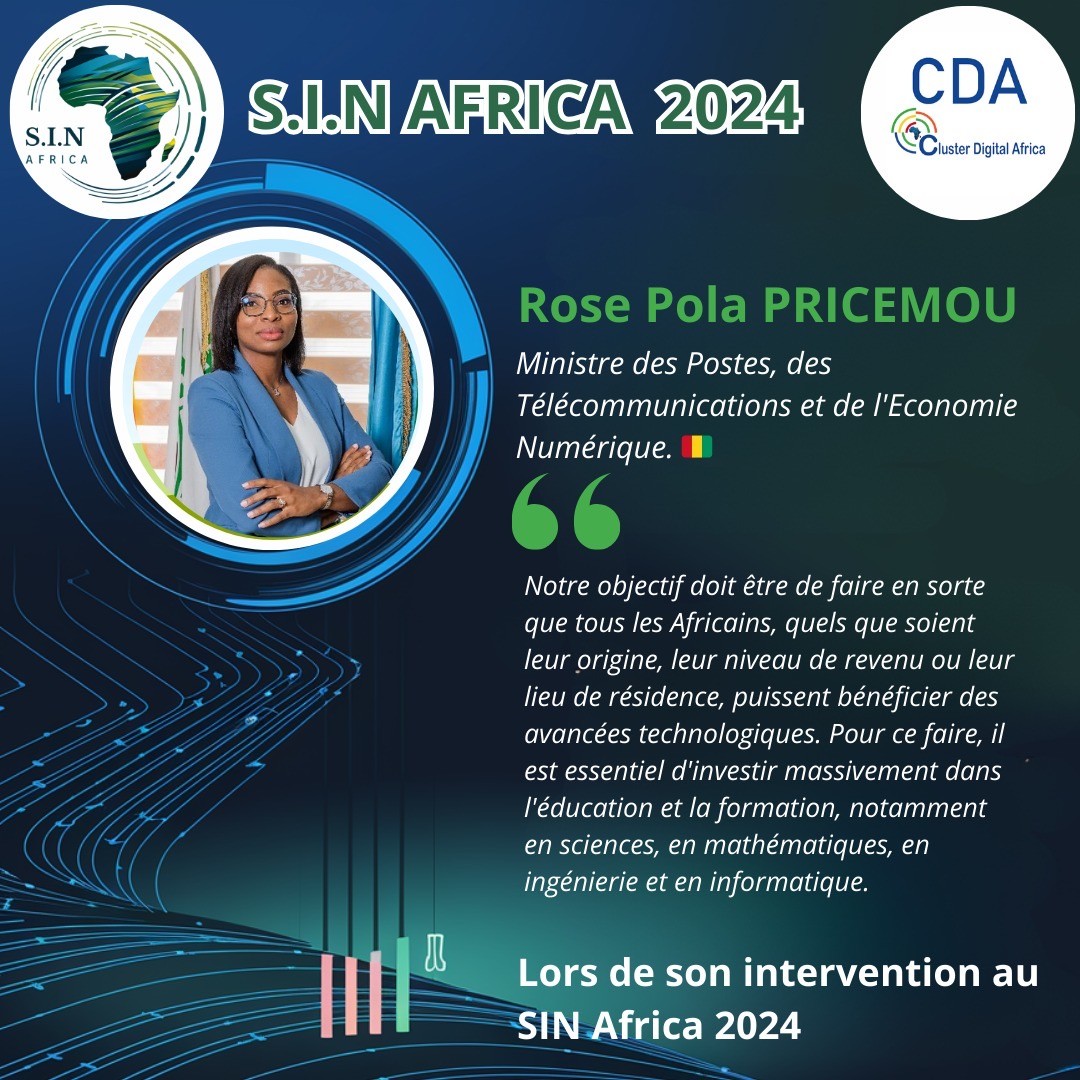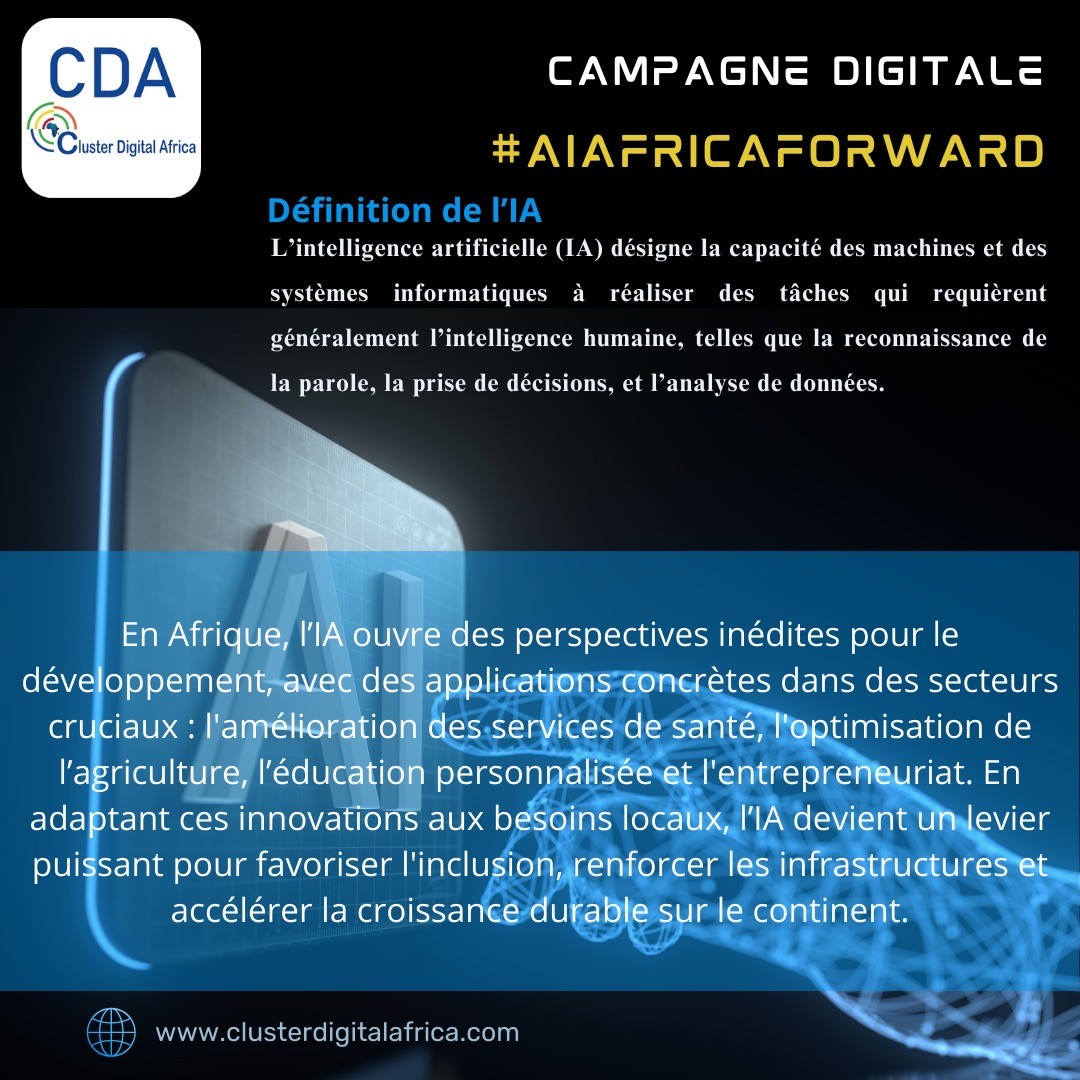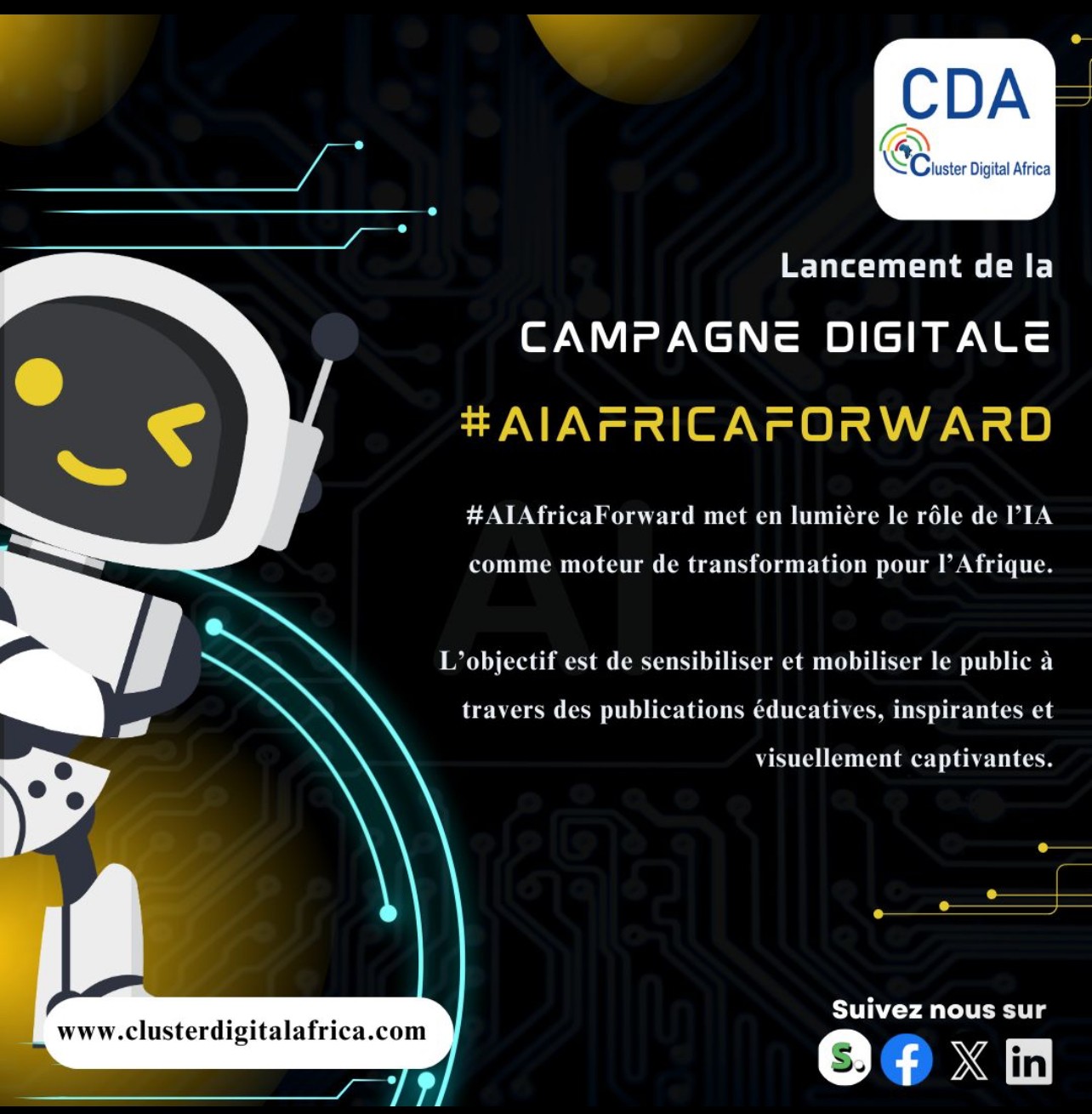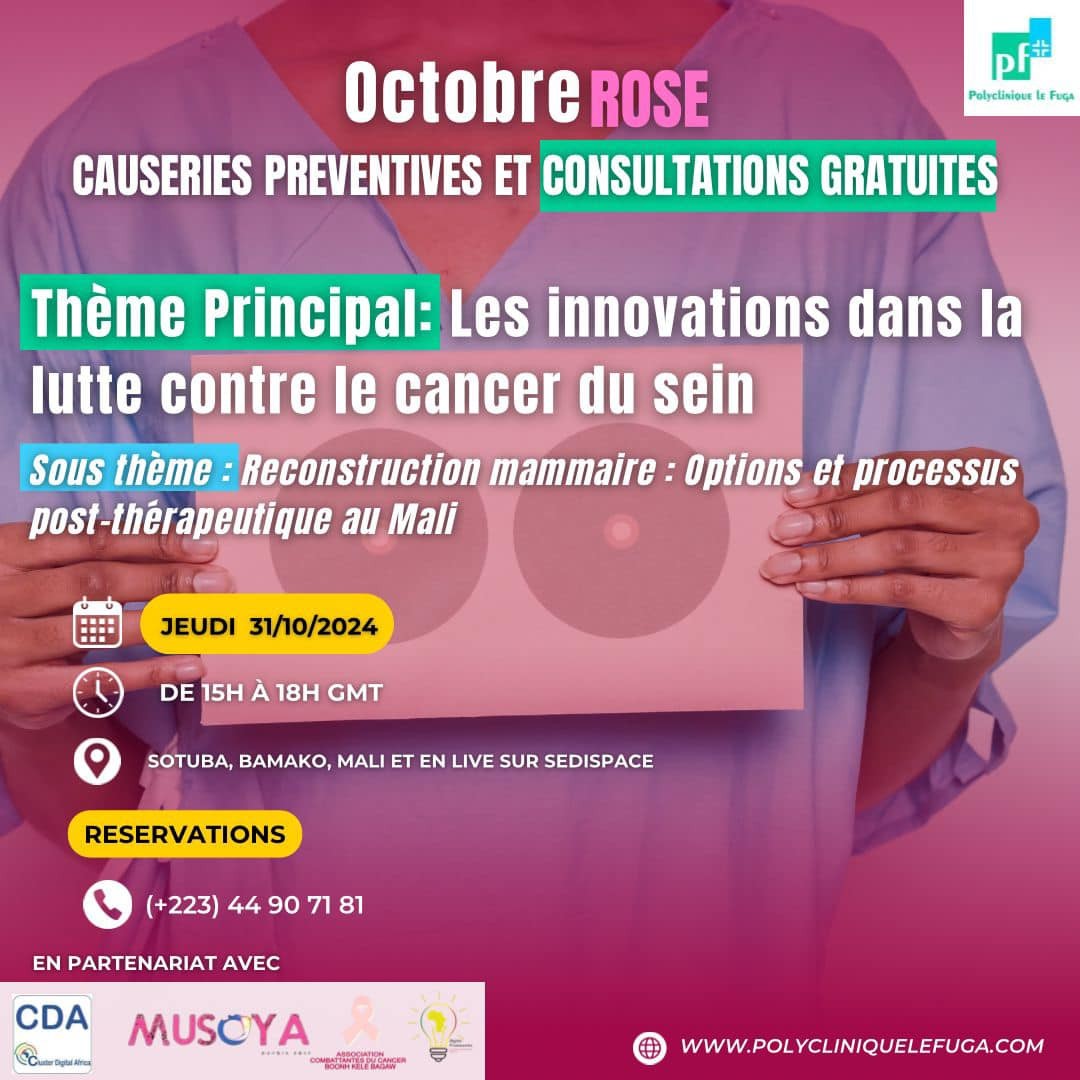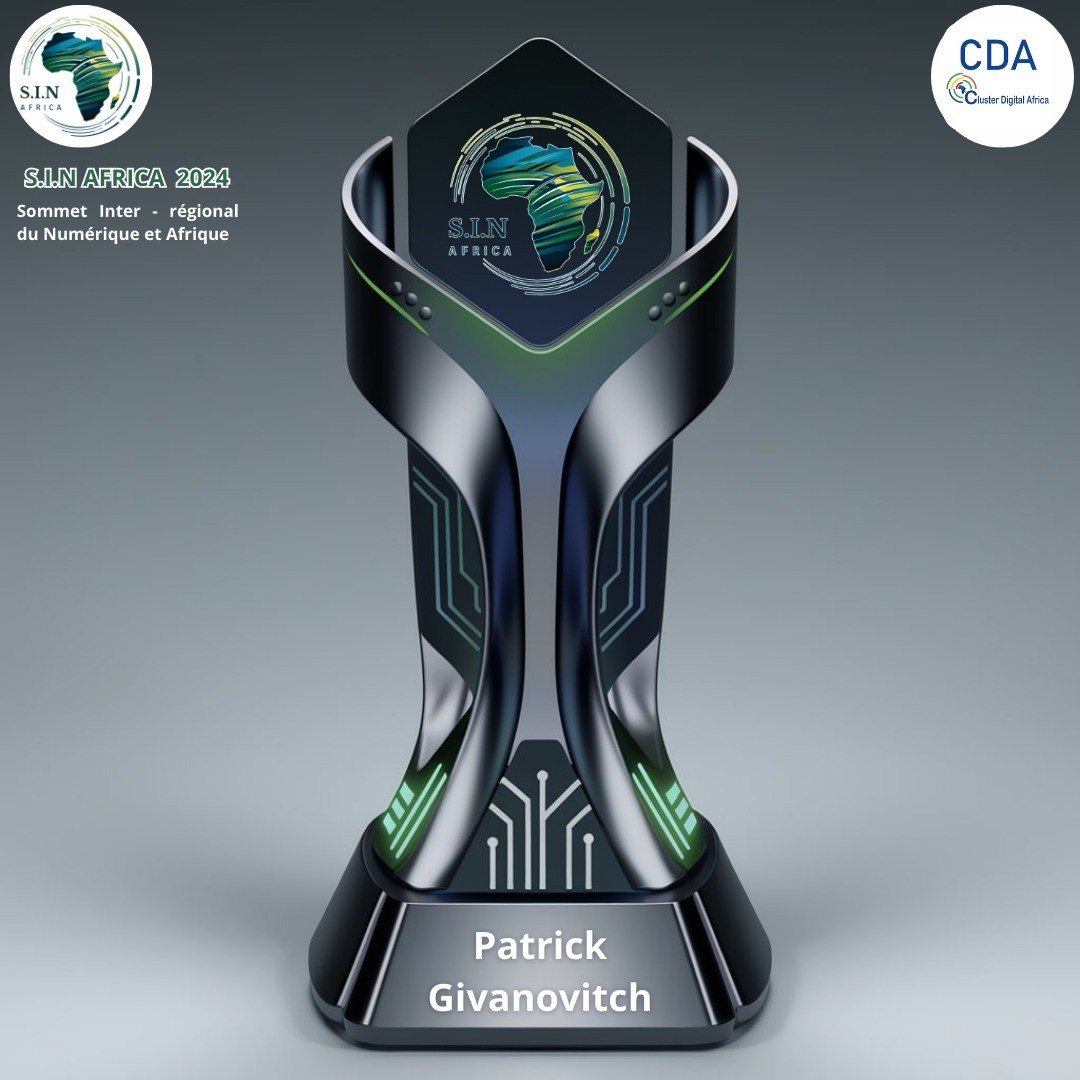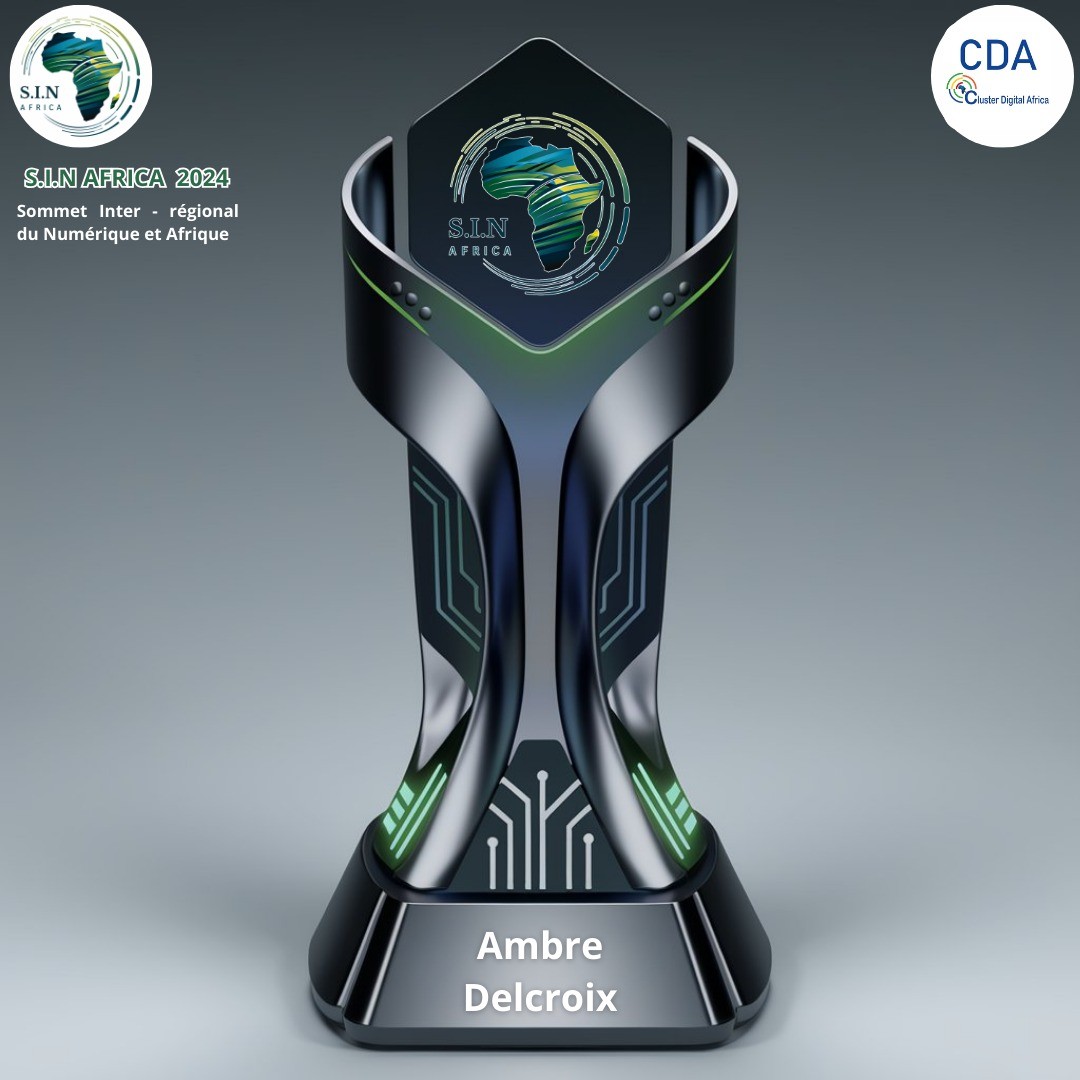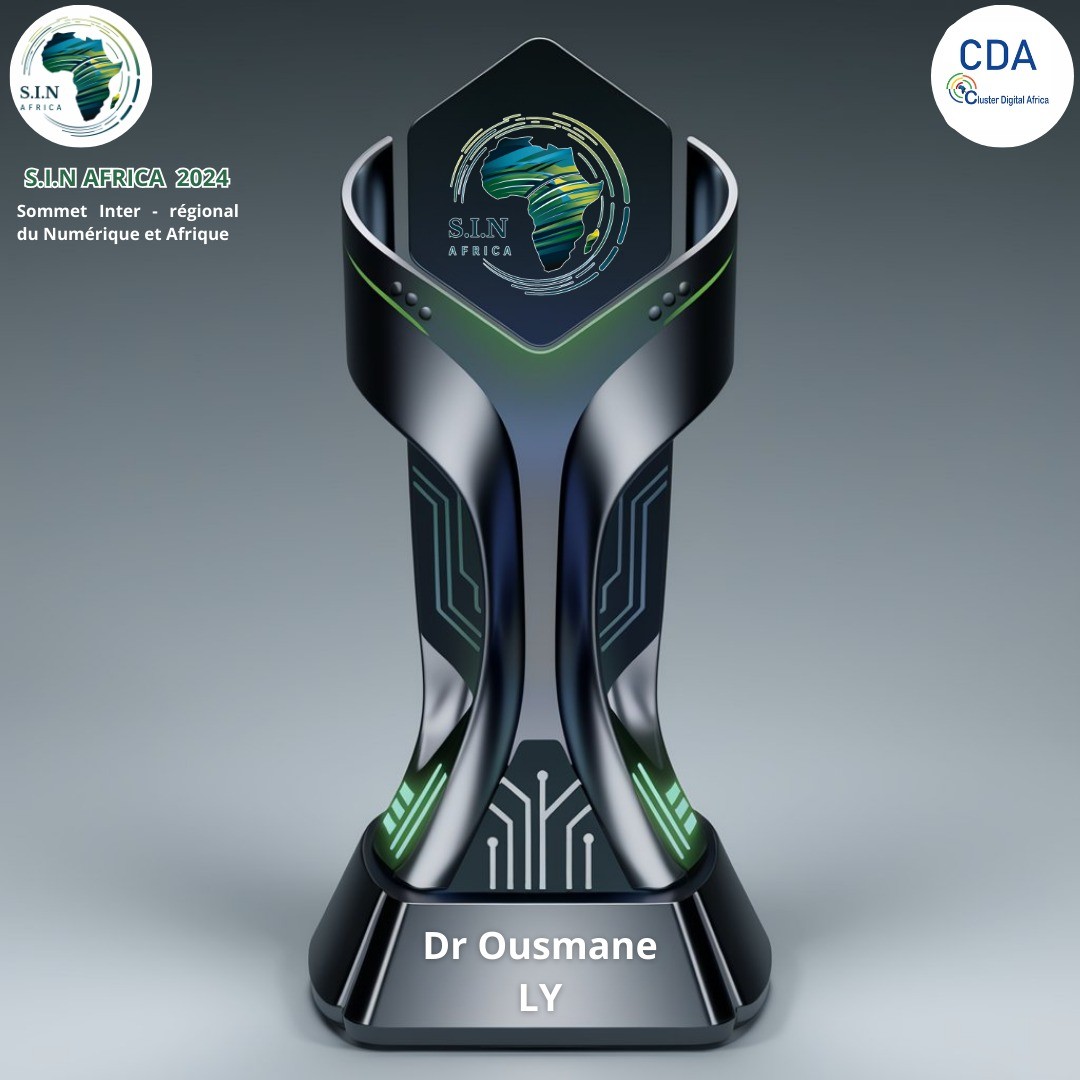𝐑𝐞𝐣𝐨𝐢𝐠𝐧𝐞𝐳-𝐧𝐨𝐮𝐬 𝐩𝐨𝐮𝐫 𝐮𝐧 𝐰𝐞𝐛𝐢𝐧𝐚𝐢𝐫𝐞 𝐢𝐧𝐬𝐩𝐢𝐫𝐚𝐧𝐭 !
🗓 Date : Mardi 26 Novembre 2024
🕒 Heure : 19h GMT
📍 Plateforme : SediSpace
Thème : 𝐃𝐞 𝐥𝐚 𝐭𝐫𝐚𝐝𝐢𝐭𝐢𝐨𝐧 𝐚̀ 𝐥'𝐢𝐧𝐧𝐨𝐯𝐚𝐭𝐢𝐨𝐧 : 𝐥𝐞 𝐬𝐭𝐨𝐫𝐲𝐭𝐞𝐥𝐥𝐢𝐧𝐠 𝐚𝐮 𝐜œ𝐮𝐫 𝐝𝐞 𝐥𝐚 𝐭𝐫𝐚𝐧𝐬𝐟𝐨𝐫𝐦𝐚𝐭𝐢𝐨𝐧 𝐝𝐢𝐠𝐢𝐭𝐚𝐥𝐞 𝐞𝐧 𝐀𝐟𝐫𝐢𝐪𝐮𝐞
Découvrez comment le storytelling peut catalyser l'innovation et transformer les stratégies numériques en Afrique. Ce webinaire réunira des experts pour explorer le rôle essentiel de la narration dans le monde digital d’aujourd’hui.
✨ 𝐒𝐩𝐞𝐚𝐤𝐞𝐫𝐬 :
- Giselle Hardt : Ambassadrice du CDA au Brésil et consultante en communication stratégique
- Dr. Nawal Houti : Propriétaire & Directrice Générale de Brand Factory
- Dr. Rabiâ El Gharbaoui : PhD en Humanités
🎤 Modérateur :
- Belkacem Doumar : Formateur universitaire et ambassadeur du CDA
📌 Inscrivez-vous dès maintenant pour réserver votre place et participer à cette discussion captivante !
👉 Lien d'inscription ici: https://clusterdigitalafrica.com/ke-admin/webinaire/k-webinairesignup.php?webinaire=Njkz
Ne manquez pas l'opportunité de faire partie de cette conversation enrichissante !
#webinaire #storytelling #CDA #sedispace
𝐈𝐧𝐬𝐩𝐢𝐫𝐚𝐧𝐭𝐞 𝐢𝐧𝐭𝐞𝐫𝐯𝐞𝐧𝐭𝐢𝐨𝐧 𝐝𝐞 𝐌𝐦𝐞 𝐥𝐞 𝐌𝐢𝐧𝐢𝐬𝐭𝐫𝐞 𝐑𝐨𝐬𝐞 𝐏𝐨𝐥𝐚 𝐏𝐑𝐈𝐂𝐄𝐌𝐎𝐔 𝐚𝐮 𝐒𝐈𝐍 𝐀𝐟𝐫𝐢𝐜𝐚 𝟐𝟎𝟐𝟒
Lors du 𝐒𝐈𝐍 𝐀𝐟𝐫𝐢𝐜𝐚 𝟐𝟎𝟐𝟒, Mme Rose Pola PRICEMOU, Ministre des Postes, des Télécommunications et de l'Économie Numérique de Guinée 🇬🇳, a captivé l’audience avec une intervention visionnaire.
Elle a mis en lumière le rôle stratégique de l’intelligence artificielle dans la transformation numérique de l’Afrique, en insistant sur l’importance d’un écosystème numérique inclusif et éthique. Son discours a souligné la nécessité d’investir dans les infrastructures numériques, de promouvoir les talents locaux et de renforcer la collaboration régionale pour exploiter pleinement le potentiel de l’IA au service du développement durable.
Son engagement à placer l’Afrique au cœur de l’innovation technologique inspire et motive tous les acteurs du changement à poursuivre leurs efforts pour un avenir numérique prospère.
🙏 𝐌𝐞𝐫𝐜𝐢 𝐚̀ 𝐌𝐦𝐞 𝐥𝐞 𝐌𝐢𝐧𝐢𝐬𝐭𝐫𝐞 𝐩𝐨𝐮𝐫 𝐜𝐞𝐭𝐭𝐞 𝐢𝐧𝐭𝐞𝐫𝐯𝐞𝐧𝐭𝐢𝐨𝐧 𝐞𝐱𝐜𝐞𝐩𝐭𝐢𝐨𝐧𝐧𝐞𝐥𝐥𝐞 𝐞𝐭 𝐩𝐨𝐮𝐫 𝐬𝐚 𝐜𝐨𝐧𝐭𝐫𝐢𝐛𝐮𝐭𝐢𝐨𝐧 𝐚̀ 𝐟𝐚𝐜̧𝐨𝐧𝐧𝐞𝐫 𝐥’𝐚𝐯𝐞𝐧𝐢𝐫 𝐧𝐮𝐦𝐞́𝐫𝐢𝐪𝐮𝐞 𝐝𝐞 𝐥’𝐀𝐟𝐫𝐢𝐪𝐮𝐞 !
#SINAFRICA2024 #transformationdigitale #Leadership #AIAfricaForward #CDA
Ready to explore the future of user interfaces? Dive into the world of aiOS, an AI-powered operating system that promises to revolutionize how we interact with technology.
👉 Read more: https://buff.ly/3AsKRC7
#ai #uxdesign #aiOS #FutureTech #innovation
Is #ai the end of companies?
🎙️ Robb & Josh talk with Harsha Gowda (CTO) & Nitin Bhudia (Dir. of Innovation) at
@Getronics
about how orgs must use #aiagents 🤖 to avoid being abstracted out of existence.
🎧 Listen now: https://buff.ly/3Bv5qi2
#automation #TechTalk
Have you ever questioned why innovation often stalls in #academia? 🤔
📚 In his article, Abraham Loeb, Professor of Science at Harvard University, uncovers the hidden obstacles that stifle groundbreaking ideas—rigid hierarchies and fear of failure: https://buff.ly/4fgU0ge
🌍 #𝙚𝙣𝙩𝙧𝙚𝙥𝙧𝙚𝙣𝙚𝙪𝙧𝙞𝙖𝙩 : 𝐋'𝐈𝐀 𝐩𝐨𝐮𝐫 𝐥𝐞 𝐝𝐞́𝐯𝐞𝐥𝐨𝐩𝐩𝐞𝐦𝐞𝐧𝐭 𝐝𝐞 𝐥'𝐀𝐟𝐫𝐢𝐪𝐮𝐞 !
L'intelligence artificielle transforme les secteurs clés en Afrique – de la santé à l'agriculture, en passant par l'éducation et l'entrepreneuriat.
En offrant des solutions innovantes adaptées aux défis locaux, l’IA peut impulser une croissance durable et inclusive sur le continent.
Ensemble, faisons de l'IA un moteur de progrès pour un avenir meilleur en Afrique !
#innovation #developpementdurable #opportunités
𝐋𝐚𝐧𝐜𝐞𝐦𝐞𝐧𝐭 𝐝𝐞 𝐥𝐚 𝐜𝐚𝐦𝐩𝐚𝐠𝐧𝐞 𝐝𝐢𝐠𝐢𝐭𝐚𝐥𝐞 #𝙚𝙣𝙩𝙧𝙚𝙥𝙧𝙚𝙣𝙚𝙪𝙧𝙞𝙖𝙩 !
Nous sommes ravis de lancer #AIAfricaForward, une initiative inspirée du SIN Africa 2024, pour mettre en lumière le rôle de l’IA en tant que moteur de transformation pour l'Afrique. 🌍
Cette campagne explore comment l'intelligence artificielle, bien que complexe, peut être rendue accessible et devenir un levier puissant de changement dans des domaines essentiels comme la 𝐬𝐚𝐧𝐭𝐞́, 𝐥'𝐞́𝐝𝐮𝐜𝐚𝐭𝐢𝐨𝐧, 𝐥'𝐞𝐧𝐭𝐫𝐞𝐩𝐫𝐞𝐧𝐞𝐮𝐫𝐢𝐚𝐭, 𝐥𝐚 𝐠𝐨𝐮𝐯𝐞𝐫𝐧𝐚𝐧𝐜𝐞...
Chaque semaine, nous partagerons des publications éducatives et captivantes, dévoilant des exemples concrets de l'impact de l'IA pour résoudre les défis uniques de notre continent.
📲 𝐑𝐞𝐣𝐨𝐢𝐠𝐧𝐞𝐳-𝐧𝐨𝐮𝐬 𝐞𝐭 𝐝𝐞́𝐜𝐨𝐮𝐯𝐫𝐞𝐳 𝐜𝐨𝐦𝐦𝐞𝐧𝐭 𝐥'𝐈𝐀 𝐩𝐞𝐮𝐭 𝐩𝐫𝐨𝐩𝐮𝐥𝐬𝐞𝐫 𝐥'𝐀𝐟𝐫𝐢𝐪𝐮𝐞 𝐯𝐞𝐫𝐬 𝐝𝐞 𝐧𝐨𝐮𝐯𝐞𝐥𝐥𝐞𝐬 𝐨𝐩𝐩𝐨𝐫𝐭𝐮𝐧𝐢𝐭𝐞́𝐬 !
Abonnez-vous, partagez et participez à la conversation. Ensemble, faisons avancer l'Afrique !
#AIAfricaForward #SINAFRICA2024 #transformationdigitale #IApourlAfrique #ClusterDigitalAfrica #sedispace #innovation #Mali #Afrique #digitaltransformation #africa #entrepreneurship #Community #GlobalNetwork #JoinUs
#usa #uk #canada #Australia #NewZealand #southafrica #nigeria #kenya #Ghana #india
#newyork #london #LosAngeles #toronto #Sydney #Melbourne #CapeTown #Lagos #Accra #Mumbai
https://hellobiz.fr/2024/11/03/lia-detruit-les-cabinets-davocats-ces-taches-a-milliers-deuros-maintenant-faites-pour-presque-rien/
L’IA détruit les cabinets d’avocats : ces tâches à milliers d’euros maintenant faites pour presque rien
OpenAI bouleverse le monde juridique en réalisant des économies spectaculaires grâce à ses nouvelles innovations IA.
03/11/2024Marc DE ZORDO36
Partager
Cette révolution de l'IA bouleverse les cabinets d'avocats avec des économies inattendues
Les avancées technologiques transforment de nombreux secteurs, et le domaine juridique n’est pas épargné. Les modèles d’intelligence artificielle, notamment ceux développés par OpenAI, redéfinissent la manière dont les tâches sont exécutées. Cette révolution entraîne des économies significatives, mais soulève aussi des préoccupations quant à l’avenir de certains métiers.
Les innovations d’OpenAI révolutionnent le secteur juridique....
L’IA au service du bien: le sommet de Genève souligne la fracture numérique et appelle à une IA sûre et inclusive. #IA #ai #innovation
Le NHS britannique ouvre sa première clinique de physiothérapie gérée par une IA. 92% des patients ont obtenu un rendez-vous le jour même, 80% ont vu une amélioration de leurs symptômes. #IA #santé #innovation
🎀 #Octobrerose : Dernière #CauseriePréventive et #ConsultationsGratuites 🎀
La gouvernance du Cluster Digital Africa félicite sa vice-présidente, la valeureuse Coumba Bah et sa secrétaire générale, Ahoua Idrissa Ly pour leur engagement exceptionnel en faveur des femmes. Le président de la #CommissionActionHumanitaire du Cluster Digital Africa Ouahid ABASSI remercie également tous les partenaires associatifs et la Polyclinique Fuga pour leur collaboration dans cette initiative de sensibilisation.
Cette semaine, la causerie aura lieu exceptionnellement le #jeudi 31 #octobre, et non le samedi habituel. Ne manquez pas cette occasion d’en apprendre plus sur les innovations dans la lutte contre le cancer du sein !
🗓️ Date : #jeudi 31 octobre 2024
🕒 Heure : De 15h à 18h GMT
📍 Lieu : Polyclinique Fuga
Sotuba, Bamako
📡 En direct également sur #sedispace
💡 Thème Principal :
Les innovations dans la lutte contre le #cancerdusein
Sous-thème :
#ReconstructionMammaire : Options et processus post-thérapeutique au #Mali
Cet échange sera animé par Mme #CoumbaBah, fondatrice de #Musoya, avec la participation de Mme Faye Kadiatou Kante , présidente de l’Association des Combattantes du Cancer au Mali, ainsi qu’un spécialiste de la reconstruction mammaire. Posez toutes vos questions et découvrez les avancées les plus récentes dans ce domaine.
📞 Réservations : +223 44 90 71 81
En partenariat avec le #CDA (#ClusterDigitalAfrica), #Musoya, #AssociationCombattantesCancer, et #DigitalFrameworks.
🌍🏆 𝐑𝐞𝐜𝐨𝐧𝐧𝐚𝐢𝐬𝐬𝐚𝐧𝐜𝐞 𝐝𝐞𝐬 𝐈𝐧𝐭𝐞𝐫𝐯𝐞𝐧𝐚𝐧𝐭𝐬 𝐝𝐞 𝐥𝐚 𝐓𝐚𝐛𝐥𝐞 𝐑𝐨𝐧𝐝𝐞 𝟔 : "𝐋'𝐈𝐀 𝐚𝐮 𝐒𝐞𝐫𝐯𝐢𝐜𝐞 𝐝𝐞 𝐥𝐚 𝐒𝐚𝐧𝐭𝐞́ 𝐞𝐧 𝐀𝐟𝐫𝐢𝐪𝐮𝐞 : 𝐎𝐩𝐩𝐨𝐫𝐭𝐮𝐧𝐢𝐭𝐞́𝐬 𝐞𝐭 𝐃𝐞́𝐟𝐢𝐬"
Le Cluster Digital Africa (CDA) est honoré de remettre des trophées aux participants de la table ronde 6 du SIN Africa 2024, qui ont exploré avec passion les possibilités et les défis de l'IA dans le domaine de la santé en Afrique. Grâce à leurs interventions, ils ont souligné l'importance de la technologie pour transformer le secteur de la santé en faveur des populations africaines.
Invité d’honneur :
* Patrick Givanovitch, Président d'honneur du CDA pour son engagement à promouvoir des solutions innovantes en santé
Speakers :
* *Ambre DELCROIX*, Journaliste (Modératrice), pour sa modération éclairée et son expertise journalistique qui ont permis des échanges riches et inspirants.
* Ousmane LY, Consultant international en santé publique, pour ses contributions éclairées sur l'impact de l'IA dans les systèmes de santé africains et ses perspectives sur les initiatives de santé publique.
* Ibrahim DICKO, Docteur en médecine humaine, Polyclinique RIVIERA, pour son partage de savoir en médecine et ses idées sur l’utilisation de l’IA pour améliorer les soins médicaux.
Un grand merci à ces experts pour leurs idées visionnaires qui contribuent à bâtir un avenir de santé plus connecté et inclusif pour l'Afrique !
Pour ne manquer aucune de nos actualités, rejoignez nous sur www.sedispace.com
L’application est téléchargeable sur 🆓⤵️
➡️PlayStore: https://play.google.com/store/apps/details?id=com.kinguisocial.app
➡️AppStore : https://apps.apple.com/ml/app/kingui-social/id1547967038?l=fr
#SINAFRICA2024 #SantéEnAfrique #IA #trophées #CDA #innovation
🌍🏆 𝐑𝐞𝐜𝐨𝐧𝐧𝐚𝐢𝐬𝐬𝐚𝐧𝐜𝐞 𝐝𝐞𝐬 𝐈𝐧𝐭𝐞𝐫𝐯𝐞𝐧𝐚𝐧𝐭𝐬 𝐝𝐞 𝐥𝐚 𝐓𝐚𝐛𝐥𝐞 𝐑𝐨𝐧𝐝𝐞 𝟔 : "𝐋'𝐈𝐀 𝐚𝐮 𝐒𝐞𝐫𝐯𝐢𝐜𝐞 𝐝𝐞 𝐥𝐚 𝐒𝐚𝐧𝐭𝐞́ 𝐞𝐧 𝐀𝐟𝐫𝐢𝐪𝐮𝐞 : 𝐎𝐩𝐩𝐨𝐫𝐭𝐮𝐧𝐢𝐭𝐞́𝐬 𝐞𝐭 𝐃𝐞́𝐟𝐢𝐬"
Le Cluster Digital Africa (CDA) est honoré de remettre des trophées aux participants de la table ronde 6 du SIN Africa 2024, qui ont exploré avec passion les possibilités et les défis de l'IA dans le domaine de la santé en Afrique. Grâce à leurs interventions, ils ont souligné l'importance de la technologie pour transformer le secteur de la santé en faveur des populations africaines.
Invité d’honneur :
* Patrick Givanovitch, Président d'honneur du CDA pour son engagement à promouvoir des solutions innovantes en santé
Speakers :
* *Ambre DELCROIX*, Journaliste (Modératrice), pour sa modération éclairée et son expertise journalistique qui ont permis des échanges riches et inspirants.
* Ousmane LY, Consultant international en santé publique, pour ses contributions éclairées sur l'impact de l'IA dans les systèmes de santé africains et ses perspectives sur les initiatives de santé publique.
* Ibrahim DICKO, Docteur en médecine humaine, Polyclinique RIVIERA, pour son partage de savoir en médecine et ses idées sur l’utilisation de l’IA pour améliorer les soins médicaux.
Un grand merci à ces experts pour leurs idées visionnaires qui contribuent à bâtir un avenir de santé plus connecté et inclusif pour l'Afrique !
Pour ne manquer aucune de nos actualités, rejoignez nous sur www.sedispace.com
L’application est téléchargeable sur 🆓⤵️
➡️PlayStore: https://play.google.com/store/apps/details?id=com.kinguisocial.app
➡️AppStore : https://apps.apple.com/ml/app/kingui-social/id1547967038?l=fr
#SINAFRICA2024 #SantéEnAfrique #IA #trophées #CDA #innovation
🌍🏆 𝐑𝐞𝐜𝐨𝐧𝐧𝐚𝐢𝐬𝐬𝐚𝐧𝐜𝐞 𝐝𝐞𝐬 𝐈𝐧𝐭𝐞𝐫𝐯𝐞𝐧𝐚𝐧𝐭𝐬 𝐝𝐞 𝐥𝐚 𝐓𝐚𝐛𝐥𝐞 𝐑𝐨𝐧𝐝𝐞 𝟔 : "𝐋'𝐈𝐀 𝐚𝐮 𝐒𝐞𝐫𝐯𝐢𝐜𝐞 𝐝𝐞 𝐥𝐚 𝐒𝐚𝐧𝐭𝐞́ 𝐞𝐧 𝐀𝐟𝐫𝐢𝐪𝐮𝐞 : 𝐎𝐩𝐩𝐨𝐫𝐭𝐮𝐧𝐢𝐭𝐞́𝐬 𝐞𝐭 𝐃𝐞́𝐟𝐢𝐬"
Le Cluster Digital Africa (CDA) est honoré de remettre des trophées aux participants de la table ronde 6 du SIN Africa 2024, qui ont exploré avec passion les possibilités et les défis de l'IA dans le domaine de la santé en Afrique. Grâce à leurs interventions, ils ont souligné l'importance de la technologie pour transformer le secteur de la santé en faveur des populations africaines.
Invité d’honneur :
* Patrick Givanovitch, Président d'honneur du CDA pour son engagement à promouvoir des solutions innovantes en santé
Speakers :
* *Ambre DELCROIX*, Journaliste (Modératrice), pour sa modération éclairée et son expertise journalistique qui ont permis des échanges riches et inspirants.
* Ousmane LY, Consultant international en santé publique, pour ses contributions éclairées sur l'impact de l'IA dans les systèmes de santé africains et ses perspectives sur les initiatives de santé publique.
* Ibrahim DICKO, Docteur en médecine humaine, Polyclinique RIVIERA, pour son partage de savoir en médecine et ses idées sur l’utilisation de l’IA pour améliorer les soins médicaux.
Un grand merci à ces experts pour leurs idées visionnaires qui contribuent à bâtir un avenir de santé plus connecté et inclusif pour l'Afrique !
Pour ne manquer aucune de nos actualités, rejoignez nous sur www.sedispace.com
L’application est téléchargeable sur 🆓⤵️
➡️PlayStore: https://play.google.com/store/apps/details?id=com.kinguisocial.app
➡️AppStore : https://apps.apple.com/ml/app/kingui-social/id1547967038?l=fr
#SINAFRICA2024 #SantéEnAfrique #IA #trophées #CDA #innovation
🌍🏆 𝐑𝐞𝐜𝐨𝐧𝐧𝐚𝐢𝐬𝐬𝐚𝐧𝐜𝐞 𝐝𝐞𝐬 𝐈𝐧𝐭𝐞𝐫𝐯𝐞𝐧𝐚𝐧𝐭𝐬 𝐝𝐞 𝐥𝐚 𝐓𝐚𝐛𝐥𝐞 𝐑𝐨𝐧𝐝𝐞 𝟔 : "𝐋'𝐈𝐀 𝐚𝐮 𝐒𝐞𝐫𝐯𝐢𝐜𝐞 𝐝𝐞 𝐥𝐚 𝐒𝐚𝐧𝐭𝐞́ 𝐞𝐧 𝐀𝐟𝐫𝐢𝐪𝐮𝐞 : 𝐎𝐩𝐩𝐨𝐫𝐭𝐮𝐧𝐢𝐭𝐞́𝐬 𝐞𝐭 𝐃𝐞́𝐟𝐢𝐬"
Le Cluster Digital Africa (CDA) est honoré de remettre des trophées aux participants de la table ronde 6 du SIN Africa 2024, qui ont exploré avec passion les possibilités et les défis de l'IA dans le domaine de la santé en Afrique. Grâce à leurs interventions, ils ont souligné l'importance de la technologie pour transformer le secteur de la santé en faveur des populations africaines.
Invité d’honneur :
* Patrick Givanovitch, Président d'honneur du CDA pour son engagement à promouvoir des solutions innovantes en santé
Speakers :
* *Ambre DELCROIX*, Journaliste (Modératrice), pour sa modération éclairée et son expertise journalistique qui ont permis des échanges riches et inspirants.
* Ousmane LY, Consultant international en santé publique, pour ses contributions éclairées sur l'impact de l'IA dans les systèmes de santé africains et ses perspectives sur les initiatives de santé publique.
* Ibrahim DICKO, Docteur en médecine humaine, Polyclinique RIVIERA, pour son partage de savoir en médecine et ses idées sur l’utilisation de l’IA pour améliorer les soins médicaux.
Un grand merci à ces experts pour leurs idées visionnaires qui contribuent à bâtir un avenir de santé plus connecté et inclusif pour l'Afrique !
Pour ne manquer aucune de nos actualités, rejoignez nous sur www.sedispace.com
L’application est téléchargeable sur 🆓⤵️
➡️PlayStore: https://play.google.com/store/apps/details?id=com.kinguisocial.app
➡️AppStore : https://apps.apple.com/ml/app/kingui-social/id1547967038?l=fr
#SINAFRICA2024 #SantéEnAfrique #IA #trophées #CDA #innovation


